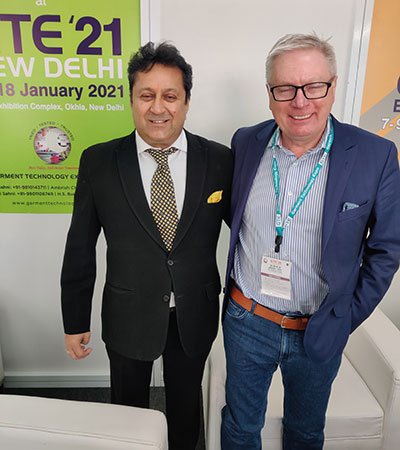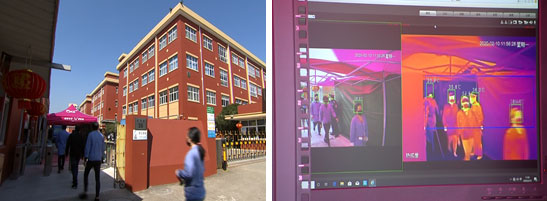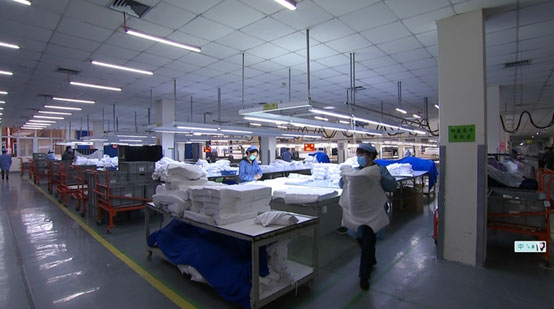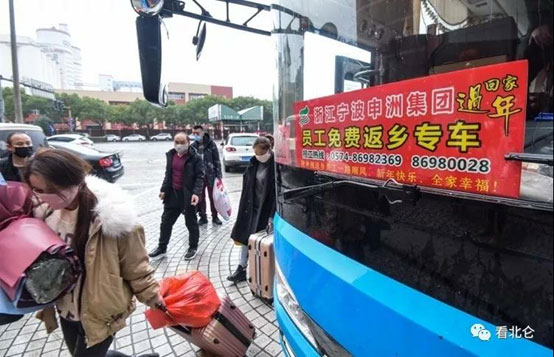FW
Fashion brands the world over are closing their stores for now in the wake of COVID-19. Urban Outfitters, the group that owns the homonymous brand, Anthropologie and Free People, has closed all of its stores in the United States, Europe, and Canada. VF Corporation owner of brands such as Vans, The North Face and Timberland is closing its stores across North America, its most successful market by revenue. Similar actions have been taken in the EMEA region and the Asia Pacific. Inditex has closed its stores in Spain. In total, the group has 1,953 points in the country, which consists of brands such as Zara, Massimo Dutti, Bershka, Stradivariusm, Oysho and Uterqüe.
Athletic apparel company Lululemon has closed all of its stores in North America and in Europe. The American company has a total of 479 stores. Fast Retailing has closed its stores in France and Spain. US-based Abercrombie will close its stores in the United States, Canada, and Europe, which amounts to 338 stores in these markets. For the brand, the United States is one of its most important markets in terms of revenue and store presence, as the company has more than half of its stores in this market.
Iluna’s smart laces are beautiful, innovative and responsible and totally made with recycled yarns even in the stretch part. The premium ingredients are recycled polyamide yarn Q-Nova by Fulgar, a fiber made with regenerated raw materials that is Global Recycled Standard (GRS) certified, and GRS certified premium stretch fiber Roica EF by Asahi Kasei that gives superior comfort and performance fit. The laces are also combined with Bluesign certified silk, to ensure a fiber production chain aimed at improving environmental performance.
Iluna started out in 1969 with the production of pre-shaped bra cups. The products which constitute the core business of the group are elastic and hard lace for underwear, corsetry, hosiery, beachwear and apparel, seamless items using Karl Mayer technology as well as microfiber fabric and tulle. Recently Iluna Lab was added, a hub of technological and stylistic innovations. Iluna’s spearheads are the Black Label series, enriched by ultrathin lace, and the GRS certified Green Label line.
Roica Advanced fit for living is a premium stretch fiber with an innovative range of smart functions to suit the modern wardrobe. Roica shapes comfort with high quality, performance and fit, adding value to everyday living for sport, activewear, intimates, fashion and career wear.
Earth Logic Action Plan urges businesses across the global fashion sector to radically transform their models in such a way that places nature ahead of short-term financial gain.
This program has been devised by a group of academics, businesses and thought leaders to help fashion firms align with planetary boundaries and address the climate and nature emergencies. The plan wants the fashion sector to reduce its use of virgin resources by 75 per cent by 2030. In order to make this transformation, the plan offers advice on changing business processes, forging new collaborations and managing the financial and social implications of growing out of growth. It also offers advice on the processes needed to maintain and upscale fashion with Earth Logic at its core, including policymaker engagement.
The fashion industry is involved in climate and nature crises. Humanity is now consuming almost twice as many natural resources as the planet can produce. Fashion is estimated to account for around ten per cent of global emissions annually – more than international shipping and aviation combined. It has also been strongly linked to deforestation and water pollution. Between 80 billion to 120 billion garments and 20 billion pairs of shoes are manufactured annually.
 UK-based company Xeros Technology launched a new machine at the recently held Garment Technology Expo. “Our products enable us to improve water usage significantly,” states Mark Nichols, CEO of the company. For its future expansion into the South Asian market, the brand has collaborated with Ramsons. It further plans to foray into Africa and East Asia markets in collaboration with the company. “We are negotiating with the company for our foray into the Bangladesh, Sri Lanka and India markets,” adds Nichols.
UK-based company Xeros Technology launched a new machine at the recently held Garment Technology Expo. “Our products enable us to improve water usage significantly,” states Mark Nichols, CEO of the company. For its future expansion into the South Asian market, the brand has collaborated with Ramsons. It further plans to foray into Africa and East Asia markets in collaboration with the company. “We are negotiating with the company for our foray into the Bangladesh, Sri Lanka and India markets,” adds Nichols.
Recently, the cost of Xeros machines increased significantly. However, these costs are offset by the multifold use that these machines have. “Our machines can be used for desizing, stone washing, bleaching, cleaving of denims in one continuous cycle. You don’t have to take garments in and out of machines repeatedly. This reduces lead times considerably and customers can get more products out of the machine,” views Nichols.
A technology licensing company, Xeros follows a different business model for the apparel industry. “We have a license agreement with Sea Lion in China, according to which IFT will launch our machines into India. These machines will help our customers prevent their clothes from being damaged during the washing process. They will also improve the outcome of these clothes during the cleaning process,” claims Nichols.
According to Nichols, Ramsons will sell hundreds of Xeros machines in a year. “We plan use spray technologies for this,” notes Nichols. The company has invested a huge amount in developing this technology in collaboration with the CNA Group. “CNA embellishes our designs, while we provide engineering solutions come from our end. Our Indian partners are creative and fast. The level of cooperation between us is fantastic,” he adds.
Xeros also offers small commercial washing machines. “These reduce maintenance costs. In the beginning, our technologies met with ample resistance and we had to push really hard for their use,” Nichols avers.
India has taken to sustainability in a big way. Not only has it introduced new regulations to enforce sustainability but has also launched zero discharge rules. According to Xeros, adoption of such new technologies will help make the world sustainable. “We need to phase fossil fuel-based technologies besides revamping our consumers’ behavior. We also need to launch washing machines that identify and remove micro particles. Consumers don’t pay more though they say they will. Brands and retailers want everything at a lower cost,” adds Nichols.
There is a well-known saying in China’s textile industry to commend Shenzhou International Group quoted as “Shenzhou is to the knitting industry what Foxconn is to the electronics industry”, speaking highly of the knitting giant that has grown up synchronically with the rapid development of the whole textile industry in China over the years.
As a role model in the industry, Shenzhou is the largest employer with approximately 100,000 employees working diligently in different factories both at home and abroad where there has been an overwhelming job growth of its operations both in Cambodia and Vietnam.
The COVID-19 has an across-the-board impact, which aroused media and government concerns over the business and employment especially in the big companies because their ups and downs have a penetrating influence on the whole textile industry. According to its latest corporate report, as of Feb.28, the actual production capacity was running at 95% since its facilities were rebooted on Feb.10 in the homeland operations, and the pause before the production got restarted would soon be made up for and the finished goods delivery would be realized on time without delay.
 |
| Mr. Ma Jianrong, Chairman of the Group being interviewed by media |
In fact, on the very date of Feb.10, the first lot of workers coming back to work amounted to 14,000 in number in different localities, 39% of Shenzhou’s 40,000 homestay jobs inside the country. In an on-site interview, Mr. Ma said “The workers who have come back to this production base today actually spent their holidays for Spring Festival here in Beilun District of Ningbo city without going to the other places. The employees now in Wenzhou city, Taizhou city inside our Zhejiang province or workers in Hubei province, where the novel coronavirus situation is a bit severe, are requested to stay at home temporarily. If some people from those regions are already here, we get all of them tested in a professional medical check procedure. If anyone is tested to have a body temperature rise, we send him or her to the local Center of Disease Control and Prevention, and it anyone from these places is tested to result in a normal body temperature, we persuade him or her to go back home and stay there until the situation gets better on a favorable term that it is a leave of absence (LOA )with salary and annual full-time premiums.”
 |
| Shenzhou’s workers come back to workplace in Beilun District, with infrared temperature measurer working on each passer-by |
Mr. Ma went on saying that every person is asked to wear face mask with operating desk a bit away from each other and to wash hands at least three or four times a day while body temperature is measured three times during working hours in addition to the entry test. Moreover, for the sake of safety, a QR code is designed and set up for each operator with quick access to the personal updated information.

At 16:oo on the afternoon ,Feb.14, a bus with over 20 workers from other provinces pulled up in front of the dormitory building, an initial step that led to a series of chartered-bus plan to carry over 17,000 workers from 14 provinces , such as Sichuan, Gansu, Yunnan, Shanxi and Shandong , on more than 700 buses to the workplaces across the country on a proximity principle where workers in different provinces are taken to the operations nearby, said Mrs. Li Saizhen, Chairwoman of Workers Union in the company.
 |
| A chartered bus stops inside Shenzhou’s compound with workers returning to work |
Shenzhou International got publically listed in Hong Kong Stock Exchange in 2005 and turned out to gain market capitals amounting to HK$117.32 billion and dividend yield by 2.31%, and P/E by 22.12% on March 16,2020 according report by HKEX. The company’s business income is largely from the international sportswear and knit apparel brands, like Adidas, Nike, Uniqlo, Puma as well as Decathlon, Russell and Mizuno etc. and its advanced productions in vertically-integrated system on basis of knit fabric-dyeing, printing & finishing-garment package services make it the choicest one for the long-term supply chain partnership with those big names. The two production bases in Vietnam (fabric knitting and garment sewing) and one garment operation in Cambodia are playing important role in taking more orders to compensate for what is short of in China on merits and demerits conditions.
When the number of new infections is shrinking in China, the COVID-19 has swollen to be an international pandemic, dragging a lot of countries into an intractable chaos. The role model company is making itself an exemplary one in addressing the challenging issues that cropped up at the time when a new issue appears significantly spiny.
Contributed by Mr. ZHAO Hong
He is working for CHINA TEXTILE magazine as Editor-in-Chief in addition to being involved in a plethora of activities for the textile industry. He has worked for the Engineering Institute of Ministry of Textile Industry, and for China National Textile Council and continues to serve the industry in the capacity of Deputy Director of China Textile International Exchange Centre, V. President of China Knitting Industry Association, V. President of China Textile Magazine and its Editor-in-Chief for the English Version, Deputy Director of News Centre of China National Textile and Apparel Council (CNTAC), Deputy Director of International Trade Office, CNTAC, Deputy Director of China Textile Economic Research Centre. He was also elected once ACT Chair of Private Sector Consulting Committee of International Textile and Clothing Bureau (ITCB)
Vietnam’s export turnover of garment and textile products in the first two months of 2020 was down 3.5 per cent year-on-year. Shipment of clothes was down 2.3 per cent. Shipment of yarn was down 16 per cent. At present, the supply of raw materials basically meets production demand in March and April. However, the sector is facing a lot of difficulties, as the world economy is affected seriously by the coronavirus disease, resulting in a decrease in global demand.
In the first nine months of 2019, Vietnam’s exports to the US jumped by 34.8 per cent year on year. The United States is Vietnam’s largest export market. Overall, Vietnam-US trade will likely to continue to increase. However, Vietnam will need to be more careful particularly for industries such as steel, footwear and agricultural products exports to the US that have been growing. If it does not, the United States is likely to impose countervailing duties on products that it deems to harm its domestic industries. Vietnam however, will have to be even more careful to deal with origin fraud and transshipment as this has been the source of US tariffs on Vietnam in the past. The tariffs were imposed to prevent steel products that originated from China attempting to bypass anti-dumping rules.
Victoria’s Secret, owned by L Brands, has witnessed a significant decline in sales since 2017 as consumers switched to other intimates brands promoting inclusivity and comfort. The company has employed many new strategies to get their customers back including re-entering the swimwear category, hiring its first transgender and plus size model and working with outside brands in collaborations. Nevertheless, Victoria’s Secret is still a market share leader in the intimates industry in the US and worldwide. If everything goes right, Victoria’s Secret’s shapewear might be a win-win situation for the brand’s image and the shapewear industry.
US-based Victoria’s Secret is an intimate apparel brand selling bras, pajamas, perfumes and other accessories. The retailer has for years faced criticisms for an out-of-date focus on sexy styles while competitors prioritized comfort. It canceled its once-annual fashion show as viewership increasingly shunned the provocative show. L Brands has been focused on diversification of its supply chain over the past five years. The company has been in negotiations with Chinese suppliers to take costs out of the production chain to offset the increase.
A new report by The Gaurdian states, the fashion market is belatedly responding to the growing problem of overconsumption as brands such as H&M and Zara have renewed their commitments to sustainability. John Lewis has introduced labelling to encourage a culture of handing down children’s clothes. Nudie Jeans has become a success, with organic products and stores that promote repair services and resale.
Fashion has also increased its accessibility to people. There is a discernible shift from discarding clothes to repairing, reusing or even renting them. Britain. Messages from public figures, such as the environmentalist Greta Thunberg, about not buying clothes is helping persuade people to turn their backs on fast fashion. As a new research reveals, 51 per cent of Britons are opting to purchase expensive but longer-lasting clothes rather than cheaper throwaway items, up from 33 per cent a year ago.
Taiwan Textile Federation, Taiwan’s textiles and apparel exports declined 9.0 per cent in 2019 compared to the previous year to reach $9.1 billion. It was the first decrease in exports in three years since 2016.
As a result of US-China trade friction and political turmoil in Hong Kong, exports sharply decreased to Mainland China and Hong Kong. The fact that Taiwanese companies in the upstream and middle-stream sectors have relocated their production to Vietnam and Indonesia is also a factor for the decrease.
Exports of fabrics decreased 6.0 per cent to $6.2 billion, while those of spun yarns decreased by 14.0 per cent to $1.4 billion. Textile fibers exports declined 25.0 per cent to $640 million.
In regard to the top five destinations, exports to Vietnam decreased by 2.0 per cent to $2.2 billion. Fabrics exports to the country decreased 1.0 per cent to $1.7 billion, while spun yarns grew 2.0 per cent to $241.0 million.
The number of sustainable shoppers in the UK has increased by a third in the last 12 months. Customers are increasingly mindful of fashion waste and the supply chain. Though women are more for it than men, over two-thirds of UK shoppers are ready to ditch the wasteful nature of fast-fashion. They are choosing a more quality conscious approach to shopping and buying secondhand clothing and opting to recycle their cast-offs as well. Shoppers are moving away from fast fashion and there are new waves of consumers who are willing to invest in higher quality items, acknowledging that more expensive price tags might mean more mileage from certain items of clothing. In the past year, the number of people who favor clothes that will last has risen from just one-third to 51.4 per cent. On the other hand, in the same time period, the number of people in favor of fast fashion has lessened by 46.2 per cent. The fight against fast fashion and in particular against labels that peddle cheap, throwaway, trend-led clothing has gathered momentum.
Besides shopping at high streets, most fashion consumers are making more sustainable choices with their old clothes – with 71.3 per cent opting for clothing recycling rather than tossing them in the bin.












